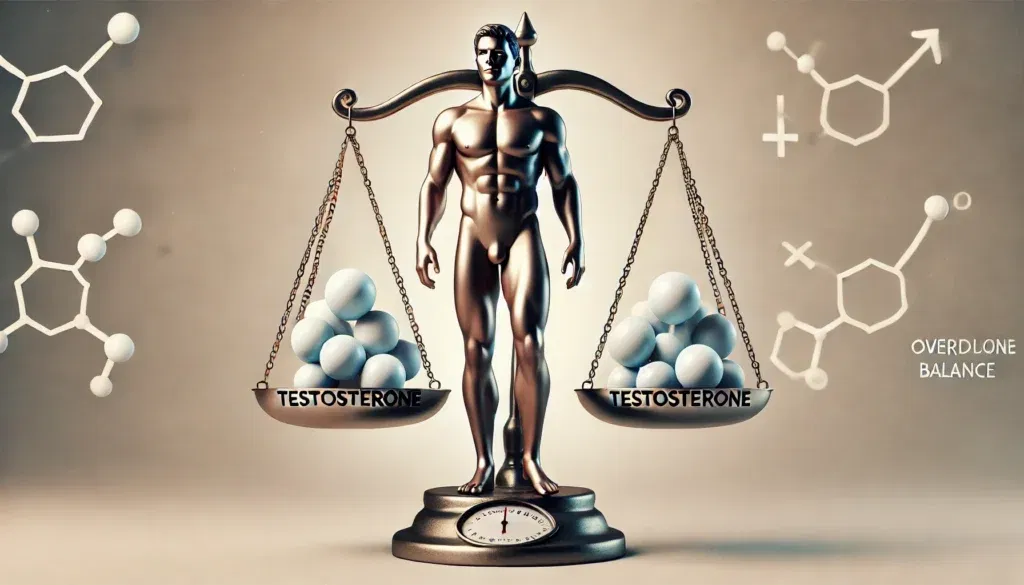Understanding Testosterone and Its Role in Men’s Health
Testosterone is the primary male sex hormone, playing a crucial role in muscle development, bone density, libido, and overall energy levels. It also influences mood, cognitive function, and metabolic health. While women also produce testosterone, men have significantly higher levels, which are necessary for their physiological and sexual development. The importance of testosterone extends beyond reproductive health, as it impacts cardiovascular function, insulin sensitivity, and even mental well-being.
You may also like: How to Get Your Testosterone Levels Checked: Best At-Home and Lab Testing Options
A well-balanced testosterone level is essential for maintaining these functions effectively. However, there has been considerable debate regarding what constitutes an optimal testosterone level. Some men may experience symptoms of deficiency even within the “normal” range, while others with higher levels may wonder if their numbers are excessive. A 900 testosterone level is often regarded as high, but the real question is whether this level is optimal, excessive, or potentially problematic. Understanding the nuances of testosterone levels and their implications for health can help men make informed decisions about their hormone status and well-being.

Defining Normal and Optimal Testosterone Levels
The reference range for total testosterone in men varies by age, laboratory standards, and medical guidelines. Generally, the normal range falls between 300 to 1,000 nanograms per deciliter (ng/dL), with variations depending on the laboratory conducting the test. The Endocrine Society considers 300 ng/dL to be the lower threshold, below which men may be diagnosed with hypogonadism, a condition characterized by low testosterone levels and associated symptoms such as fatigue, reduced libido, and loss of muscle mass.
While 900 ng/dL is well within the normal range, it is on the higher end of the spectrum. Many men function optimally in the mid-to-upper range, typically between 600 and 900 ng/dL. However, individual variability plays a significant role. Some men experience peak energy, strength, and libido at 900 ng/dL, while others may find this level unnecessary or even excessive, leading to potential side effects. Understanding where one falls within the spectrum requires assessing both symptoms and overall health.
Is a 900 Testosterone Level Optimal or Too High?
A 900 testosterone level can be ideal for many men, particularly those in their 20s and 30s when natural production is at its peak. At this level, men often report enhanced physical performance, mental clarity, and a robust sex drive. However, just because a number is within the high-normal range does not necessarily mean it is beneficial for everyone.
Factors such as genetic predisposition, lifestyle choices, and individual hormone sensitivity all contribute to how a specific testosterone level affects a person. Some men at 900 ng/dL may feel energetic and strong, while others might experience symptoms like increased aggression, irritability, or elevated red blood cell count, which can pose cardiovascular risks. The key is assessing overall well-being rather than focusing solely on numbers.
Comparing 900 Testosterone Levels to Lower Ranges
In contrast, men with a 200 testosterone level often struggle with fatigue, low libido, poor muscle retention, and depressive symptoms. This level is well below the clinical threshold and is considered a sign of significant hormonal deficiency. A man with a 200 testosterone level may experience chronic exhaustion, difficulty concentrating, and even an increased risk of osteoporosis due to diminished bone density.
While a 900 testosterone level may seem excessive to some, it is far preferable to a 200 testosterone level, which can severely impact the quality of life. However, an ideal balance lies somewhere in between, depending on an individual’s symptoms and overall health markers.
Potential Benefits of a 900 Testosterone Level
Maintaining a 900 testosterone level offers numerous benefits, provided that it does not lead to unwanted side effects. Some of the primary advantages include:
- Enhanced Muscle Growth and Strength: Higher testosterone levels contribute to increased protein synthesis, making it easier to build and maintain lean muscle mass.
- Improved Libido and Sexual Function: Testosterone is directly linked to sexual health, and a high-normal level can enhance libido, erectile function, and overall sexual satisfaction.
- Better Mood and Cognitive Function: Optimal testosterone levels support mental clarity, reduce the risk of depression, and promote a positive mood.
- Increased Energy Levels: Men with higher testosterone often report greater stamina and reduced feelings of fatigue.
- Stronger Bone Density: Higher levels of testosterone contribute to stronger bones, reducing the risk of fractures and osteoporosis as men age.
Risks of Having a High-Normal Testosterone Level
Despite its benefits, a 900 testosterone level can sometimes present challenges. Potential risks include:
- Increased Red Blood Cell Count: Excess testosterone can lead to polycythemia, a condition where the blood becomes too thick, increasing the risk of clotting and cardiovascular issues.
- Acne and Oily Skin: Elevated testosterone can stimulate excess sebum production, leading to acne flare-ups.
- Potential for Hair Loss: In genetically predisposed men, high testosterone levels may accelerate male pattern baldness.
- Elevated Estrogen Levels: Some testosterone is converted into estrogen via the aromatase enzyme, which can lead to water retention, mood swings, or gynecomastia (the development of breast tissue in men).
How Lifestyle and Diet Affect Testosterone Levels
Maintaining optimal testosterone levels is not solely dependent on genetics. Lifestyle choices, including diet, exercise, and sleep, play a significant role in regulating testosterone production. Resistance training, particularly heavy weightlifting, has been shown to naturally boost testosterone. Adequate sleep, particularly deep REM cycles, is crucial for maintaining hormonal balance.
A diet rich in healthy fats, lean proteins, and micronutrients like zinc, magnesium, and vitamin D supports testosterone production. Conversely, excessive alcohol consumption, chronic stress, and processed foods can lead to lower testosterone levels over time. By focusing on a holistic approach, men can optimize their hormonal health without relying solely on external interventions.
When to Seek Medical Evaluation
If a man experiences symptoms of high or low testosterone, hormone testing can provide clarity. Those with a 900 testosterone level who experience negative side effects should consult a healthcare provider to assess whether an adjustment is necessary. Similarly, men with a 200 testosterone level should seek medical attention, as this is indicative of a serious deficiency that may require intervention, such as testosterone replacement therapy (TRT).
A comprehensive evaluation, including free testosterone levels, estradiol, and other biomarkers, can help determine whether a man’s hormone levels are genuinely optimal or need adjustment. Physicians often assess symptoms in conjunction with lab results to make appropriate recommendations.

Frequently Asked Questions (FAQ) on Testosterone Levels
1. What does a 900 testosterone level indicate, and is it optimal?
A testosterone level of 900 ng/dL falls within the higher end of the normal range for men. While this level often correlates with increased muscle mass, better energy levels, and improved cognitive function, it does not necessarily mean that higher is always better. Individuals with a 900 testosterone level should ensure their overall health is balanced, as excessive testosterone can sometimes contribute to conditions like polycythemia (increased red blood cell count) or aggressive mood swings. However, for most individuals, a 900 testosterone level is associated with optimal physical and mental performance. It is essential to monitor free testosterone and other related hormones to understand how the body is utilizing the available testosterone effectively.
2. Can a 200 testosterone level cause significant health issues?
A testosterone level of 200 ng/dL is considered low and may lead to several health complications, including fatigue, decreased libido, muscle loss, and cognitive difficulties. Low testosterone can also increase the risk of metabolic disorders such as type 2 diabetes and cardiovascular diseases. Individuals with a 200 testosterone level should consult a healthcare professional to identify underlying causes, which could range from hormonal imbalances to lifestyle factors. Addressing low testosterone may involve natural interventions like resistance training, improved sleep hygiene, and dietary modifications. In some cases, testosterone replacement therapy (TRT) may be recommended for individuals experiencing severe symptoms.
3. How do lifestyle choices impact testosterone levels?
Lifestyle factors play a crucial role in regulating testosterone levels, whether it’s maintaining a 900 testosterone level or preventing a drop to a 200 testosterone level. Regular exercise, particularly strength training and high-intensity interval training (HIIT), can naturally boost testosterone. Sleep quality is another critical factor; poor sleep patterns have been linked to significantly lower testosterone levels. Additionally, a diet rich in healthy fats, lean proteins, and micronutrients such as zinc and vitamin D supports hormonal balance. Conversely, excessive alcohol consumption, chronic stress, and exposure to endocrine-disrupting chemicals can contribute to declining testosterone levels over time.
4. What are the psychological effects of different testosterone levels?
A 900 testosterone level is often associated with enhanced confidence, motivation, and cognitive sharpness, contributing to better overall mental health. On the other hand, individuals with a 200 testosterone level may experience symptoms such as depression, anxiety, and difficulty concentrating. Research suggests that testosterone influences neurotransmitter activity, impacting mood regulation and emotional resilience. It is important to recognize these psychological effects and seek appropriate interventions, whether through lifestyle changes or medical consultation. Balancing testosterone levels can significantly improve mental well-being and emotional stability.
5. Does age impact testosterone levels significantly?
Testosterone levels naturally decline with age, typically decreasing by about 1% per year after the age of 30. A younger man with a 900 testosterone level may experience optimal muscle growth and vitality, whereas an older man with the same level might be maintaining a strong baseline through lifestyle interventions. Conversely, an older individual with a 200 testosterone level may experience more pronounced symptoms of fatigue and muscle atrophy. Hormone replacement therapy is sometimes considered for age-related testosterone decline, but it should always be approached cautiously with a physician’s supervision.
6. Can dietary changes alone raise testosterone levels?
While diet alone may not always be sufficient to increase testosterone from a 200 testosterone level to a 900 testosterone level, it plays a foundational role. Foods rich in healthy fats, such as avocados, nuts, and olive oil, support hormone production. Lean protein sources, including eggs and grass-fed beef, contribute to muscle maintenance, which in turn supports testosterone synthesis. Additionally, micronutrients like zinc (found in shellfish and seeds) and vitamin D (from fatty fish and sun exposure) are essential for healthy testosterone levels. Eliminating processed foods and reducing sugar intake also helps maintain optimal endocrine function.
7. What role does sleep play in testosterone regulation?
Sleep is one of the most overlooked yet critical factors in maintaining healthy testosterone levels. Research shows that individuals who get less than six hours of sleep per night may experience a decline in testosterone, potentially leading to a 200 testosterone level or lower. REM sleep, in particular, is associated with peak testosterone production. Aiming for 7-9 hours of quality sleep can help sustain a 900 testosterone level, ensuring better recovery, muscle growth, and overall vitality. Sleep disorders such as sleep apnea can also contribute to low testosterone and should be addressed promptly.
8. Can high testosterone levels have negative side effects?
While a 900 testosterone level is generally considered optimal, excessively high testosterone—whether due to natural production or external supplementation—can lead to unwanted side effects. These may include increased aggression, acne, excessive body hair growth, and a higher risk of cardiovascular complications. Additionally, very high testosterone levels can suppress natural hormone production, leading to fertility issues. It’s crucial to balance testosterone within the physiological range rather than chasing extreme levels that may have unintended health consequences.
9. What are the best natural supplements for testosterone support?
Certain natural supplements can help maintain a balanced testosterone level, whether someone is trying to sustain a 900 testosterone level or improve from a 200 testosterone level. Ashwagandha, a well-known adaptogen, has been shown to support testosterone production and reduce stress-related hormonal imbalances. Fenugreek is another popular supplement that may improve free testosterone levels. Vitamin D, zinc, and magnesium are essential nutrients that directly influence hormone synthesis. However, supplementation should be approached cautiously and combined with lifestyle improvements for optimal results.
10. How does testosterone impact long-term health?
Testosterone plays a key role in long-term health, influencing everything from muscle mass preservation to metabolic function. A 900 testosterone level is often associated with better cardiovascular health, stronger bones, and improved metabolic efficiency. In contrast, a 200 testosterone level can increase the risk of conditions such as osteoporosis, obesity, and insulin resistance. Maintaining balanced testosterone levels through proper diet, exercise, and medical guidance can significantly impact aging, vitality, and overall quality of life. Regular hormone assessments can help individuals track their levels and make necessary adjustments to maintain long-term well-being.

Final Thoughts: Striking the Right Balance
A 900 testosterone level is generally considered high but within the normal range, making it optimal for many men. However, hormone health is highly individualized, and what works for one person may not be ideal for another. While a 900 testosterone level can provide numerous benefits, it is essential to monitor for any adverse effects and ensure that it aligns with overall well-being.
On the other hand, a 200 testosterone level is significantly below the healthy threshold and warrants medical intervention. The key to hormone health lies in achieving a balance that supports vitality, performance, and long-term health. By understanding the factors that influence testosterone levels and making informed choices, men can maintain hormonal health for years to come.
testosterone optimization, natural ways to boost testosterone, signs of low testosterone, TRT benefits and risks, best foods for testosterone, hormonal balance in men, testosterone and muscle growth, lifestyle changes for testosterone, healthy aging in men, high testosterone symptoms, testosterone replacement therapy, strength training for testosterone, zinc and testosterone, how sleep affects testosterone, men’s hormone health, testosterone and libido, cardiovascular health and testosterone, testosterone levels by age, symptoms of high testosterone, hormone therapy for men
Further Reading:
Normal Testosterone Levels by Age
What Are Normal Testosterone Levels?
Disclaimer: The information provided in this article is for general informational purposes only. The content does not constitute professional advice of any kind, including but not limited to medical, legal, or financial advice. HisHealthMag and its contributors make no representations or warranties regarding the accuracy, completeness, or reliability of the information presented. Always seek the advice of a qualified professional for any specific concerns or questions you may have. Neither HisHealthMag nor its authors assume any responsibility or liability for any actions taken based on the information provided in this article. The views and opinions expressed are those of the author(s) and do not necessarily reflect the official policy or position of HisHealthMag.





